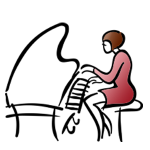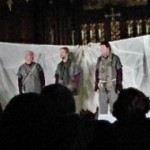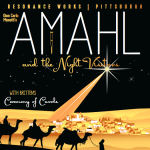Here at McVirgo Manor, Saturday afternoon often means Saturday Afternoon at the Opera on CBC Radio 2. It’s one of the benefits of living so close to our neighbors to the north (or in our case, south!)
This past weekend, the featured opera was Debussy‘s Pelléas et Mélisande, which is not the best-known opera — nor the best-known of Debussy’s works — but it’s a pretty cool piece.
What I like about the CBC’s opera broadcast is the commentary and interviews they play before the piece begins and between acts. McDoc and I were particularly amused by an interview with Scott Irvine, the tuba player from Canadian Opera Company production we were about to hear.
One of the first things Irvine and the host, Bill Richardson, discussed was the fact that the tuba only has 57 notes during the 2.5 hours of the opera, and doesn’t play at all in two of its five acts. Irvine didn’t seem to mind his limited role very much; he’s a composer as well, and said he enjoyed having so much time to just listen to the piece. And anyway, I think tuba players are used to this sort of thing. As Irvine said,
One of the hardest things about being a tuba player is not zoning out when you’re not busy… If it were a Broadway show, we’d probably be sitting in the pit reading books, but you don’t do that in classical music.”
McDoc wondered aloud why musicians who aren’t playing have to just sit there, especially if they’re out for an entire act. In my experience, orchestra pits tend to be pretty cramped, and having people shuffle in and out would be disruptive, if it were even possible. (Don’t let the fire marshall see how they pack ’em in! 😉 )
And as far as the ban on books or other pastimes — I’ve seen people sneak a book onto their music stand during rehearsal; I even remember seeing the women who played the, I believe, four notes that the celesta has in Kindertotenlieder take up her knitting while the rest of the piece was being rehearsed. But yeah, during performance it’s a no-no, even in situations where the orchestra isn’t seen by the audience. Classical music is Serious Business, don’tcha know! 😉
I’ve had the good fortune on a couple of occasions to play the piano a few orchestral pieces — I’m referring to situations where the piano is part of the orchestra (typically grouped with the percussion section), as opposed to a concerto soloist. One of the challenges of it, in addition to counting the vast measures of rest you usually have (and aside from a few cues, you don’t have the other players’ music in front of you to follow along), is having to burst into virtuosity after sitting still for long stretches of time. It’s kind of like sprinting, I guess, and it’s a little bit hard to stay warmed up while waiting on the sidelines.
That reminds me: when I was an undergrad at U.C. Berkeley, I got to play the piano part in Witold Lutosławski‘s Concerto for Orchestra. During the semester when we were rehearsing the piece, the composer came to the area to conduct a concert of his music, including the Concerto, with the San Francisco Symphony. A fellow orchestra member and I attended the concert, and charmed our way backstage to meet the maestro afterwards.
He was a very kind man, and when I told him I was playing the piano part in his piece, he laughed and told us what happened to the first pianist to have that gig. Evidently a pianist was secured at the last minute — whether due to someone else canceling, I don’t recall. This pianist was a great soloist, but not accustomed to playing with an orchestra — and keeping up with a part full of rests! He got lost early on in the piece, and never caught up. He was too embarrassed to face Lutosławski after the performance, even when they ran into each other years and years later!
Fortunately, seasoned orchestra players like our tubist friend above, as well as percussionists and others who have just a few notes (but very important ones!) usually avoid that kind of humiliation. 😛
And lest you worry about them getting bored or feeling left out with so little to do, consider this: they aren’t paid by the note… so some players might be perfectly content with a light part! 😀
Speaking of light parts, aspiring opera composers (like me) and weary would-be opera fans alike might take comfort in this pithy quote from Debussy, which Irvine cited in this interview: “in opera, there is always too much singing.” And no, the singers don’t get to read the paper while they wait for their next entrance! 😀

If you enjoyed this post, would you consider…
Thanks — you make the world a better place! 🙂





Actually I’ve seen orchestra members come in and out of the pit in the opera orchestra I play in as well as San Francisco Opera. And come players read during performance, too. The big thing is, “If the audience knows, you’d better stop!” 🙂
I’m an oboist; I don’t read, as I just don’t feel connected to the opera if I do that. To me it implies disinterest and I don’t want to appear disinterested … especially since I AM interested! Most of the time I’m playing too much to bother anyway, but in some Mozart operas I tacet a lot of arias. I still don’t like to read. (I can’t watch the opera either, as we are under the stage. Sigh.)
Counting bars (or whole movements) is one reason I decided not to pursue a degree in Trombone Performance. I could just see myself, after years of hard work, performing recitals, teaching schoolkids private lessons, not getting to do much onstage.
But then I miss it, especially for things like the Berlioz Requiem, or most of Wagner’s larger opera pieces (I’ve only done Die Meistersinger with an amateur orchestra). Oh well, next lifetime–unless I take up the cello then!
Hi Patty — Thanks for reporting from the field! It’s too bad they don’t set up a screen so you could watch the stage. I suppose some players might find that distracting. But I’ve played some music theater productions where the musicians were in one of the wings, and we had a video monitor of the stage. It was nice to be able to watch the stage action in between songs.
@ Andrew — There’s always brass quintets, y’know! 🙂
Oh, and that’s one more reason why orchestras should perform lots of recently-composed music. We modern composers like to write a lot for the previously neglected players.
We asked for a monitor of some sort and they said, “No can do … it would cost us $$.” Sigh.
In our old hall we could see the reflection of the singers as there was plexiglass on the pit “fence” between us and the audience. I loved it! 🙂